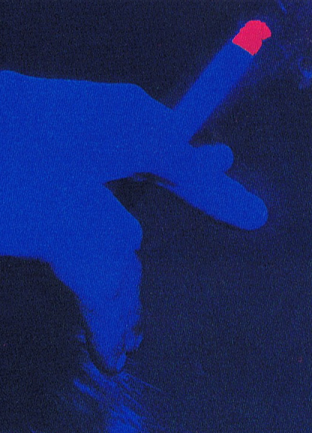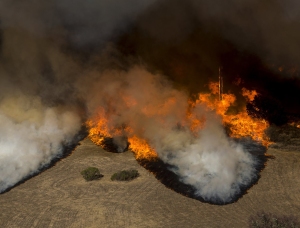Not Even A Cold War

Ironies engulf me in this month of November, 100 years after the end of the War To End All Wars, which it didn’t, of course. Instead, that war set the standard to surpass for mechanized cruelty and insanity that got only worse after it sputtered to a halt at 11am Continental Time, November 11, 1918.
A lesser irony occurred while listening to an internet radio station I like, Radio Paradise, whose name sounds as if it plays heaven-directed Christian music but that is actually so named for the town it originally transmitted from — Paradise, California — a place few people outside of Butte County had heard of until this week, when it went up in smoke in the worst California wildfire in history.

Paradise, California. (© David Mcnew/Getty Images/New York Times)
Since the station is on the internet, it is still on the air and transmitting from elsewhere. But the residents of Paradise are not as able to redirect themselves and are suffering the effects of a horror possibly as devastating for those affected by the wildfire as the fiery horrors that befell Europe 100 years ago, judging from the shear helplessness of those affected by the onslaught of an uncontrollable inferno. Perhaps it is a stretch to link WWI with the wildfires of California in 2018. But, today, RP happened to play this song, a hit for Marianne Faithful from the late 1970s.
(“Broken English”, Marianne Faithful, © 1979 Island Records)
What did she mean by “not even a cold war”? Perhaps that wars cannot stay “cold” for long before becoming something that obliterates everything civilized? Like a wildfire. It occurred to me while the song was playing how appropriate it was for RP to play this song today, of all days, November 11, 2018, one hundred years after the end of “an old war” everyone hoped would be the last of its kind, but wasn’t, from an album cover showing a lit cigarette….
I was again mesmerized by how the song’s devastating lyric has hardly aged in evoking the reality of an Englishwoman (but it could have been sung by any woman or man) coming to terms with the losses of war, however distant they may have been for her at the time. (Perhaps it is worth saying that many German’s today speak far from broken English, and, instead, have, again ironically, become the glue that now holds Europe together. The Russians, I guess, are another matter).
Interestingly, perhaps, is that the song borrows a lot of its fundamental instrumentation from the German band Kraftwerk, who certainly did sing in what could be considered somewhat broken English. Another irony.
But blogs are about words, and so here below are the words to the song. They speak for themselves; better than I can speak for them. These words hardly need a soundtrack to deliver the irony of hearing Marianne’s song played on this day, of all days, from a burned out town, in a country now, seemingly, at war with itself.
But that is maybe one irony too many for one day. But maybe not for this day, which resolved so little that it was meant to resolve, and that instead remains a day symbolizing the ultimate irony for what we can do to each other in the name of civilization, and which succeeds only to bring forth the deepest possible lamentation for the potential in equal measure in us humans to both achieve our greatness or create our destruction.
Broken English
Could have come through anytime
Cold lonely, puritan
What are you fighting for?
It’s not my securityIt’s just an old war
Not even a cold war
Don’t say it in Russian
Don’t say it in German
Say it in broken English
Say it in broken EnglishLose your father, your husband
Your mother, your children
What are you dying for?
It’s not my realityIt’s just an old war
Not even a cold war
Don’t say it in Russian
Don’t say it in German
Say it in broken English
Say it in broken English(Marianne Faithful, © 1979 Island Records)

Recent Comments